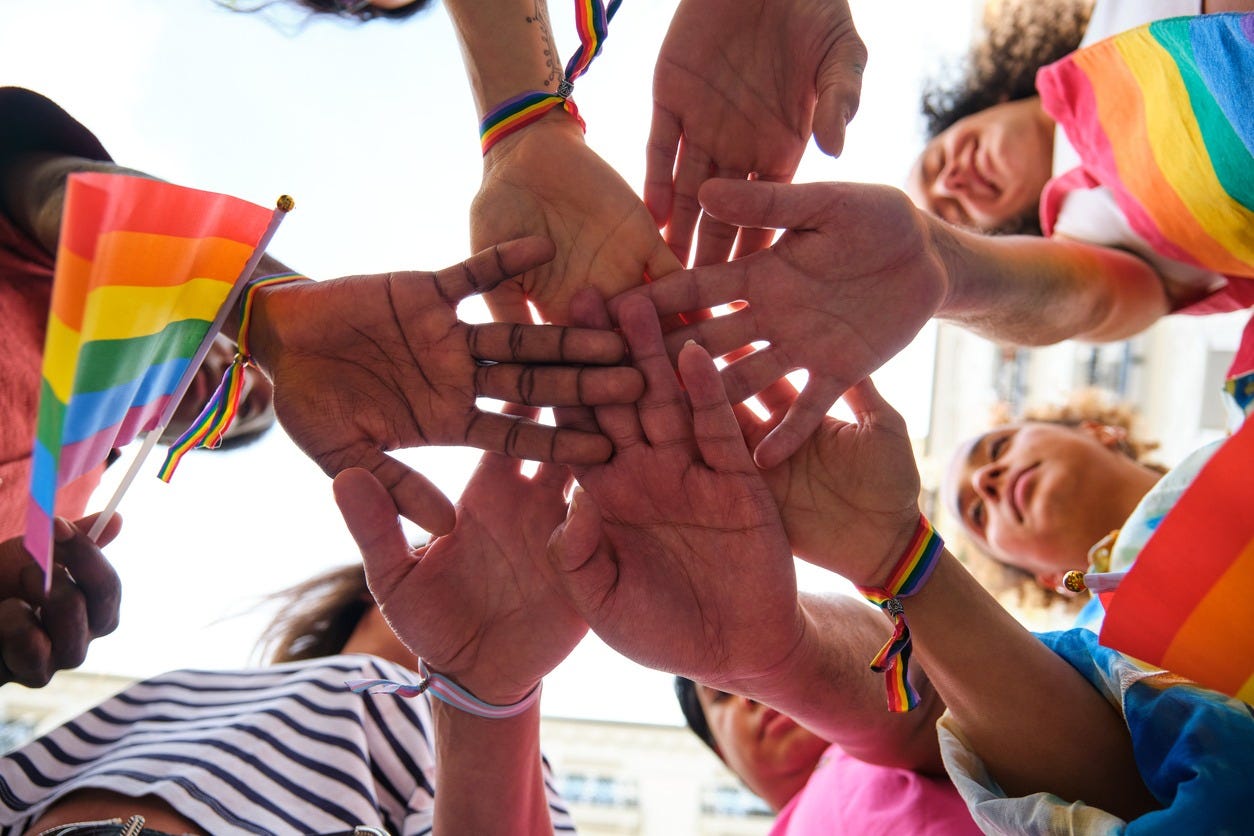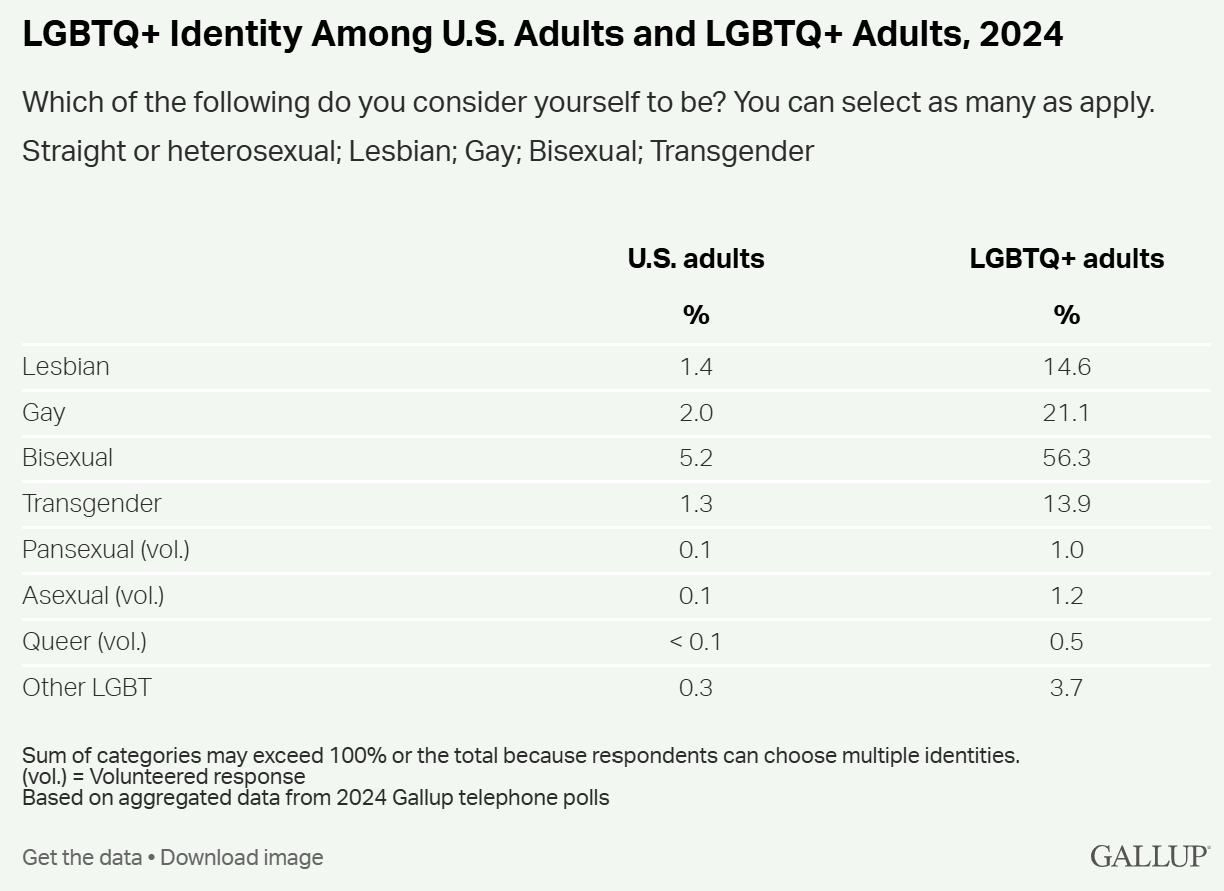
In 2024, a record share of US adults identified as LGBT. Nevertheless, public support for same-sex relationships has begun to decline.
According to a new Gallup survey, the share of American adults who identify as LGBT rose from 7.6% in 2023 to 9.3% in 2024. That’s an increase of +1.7 percentage points. The most recent figure is almost triple the share from 2012 when Gallup first asked this question.

In previous iterations of this survey, the rise in LGBT identification was primarily driven by “Gen Z” (ages 18-27). In 2024, that happened not to be the case. Instead, Millennials (ages 28-43) accounted for most of the increase. While Gen-Z identification rose only +0.8 percentage points to 23.1%, Millennial identification rose +4.4 percentage points to 14.2%.
In case you’re wondering, most of these large shares for Zers and Millennials are accounted for by the conveniently ambiguous category, “bi-sexual.” This is especially true for young women. Of all Gen-Zers who are LGBT, 59% self-identify as “bi.” Of all female Gen-Zers who are LGBT, the “bi” share has to be well over two-thirds. (The Gallup crosstabs don’t allow an exact number.)

It’s hard to say why the LBGT growth among Gen-Zers slowed to a near standstill over the past year. It could be politics. Recent surveys show that Gen Z men have trended steeply more conservative over the past year—they are even more conservative today than Millennial men. If a growing number of Gen Z men are less likely to embrace progressive social norms, they might mute increases in youth LGBT identification. (See “Gender Divide Grows Among Teens” and “More on the Widening Youth Gender Divide.”) Notably, the size gap between the share of Gen Z men who identify as LGBT (12%) and the share of Gen Z women (31%) is much higher than for older age brackets.
Looking at the entire population, just over half (56%) of LGBT people identify as bisexual, while 21% identify as gay, 15% as lesbian, and 14% as transgender. The largest increases in 2024 were among those who identified as transgender (+2.1 pp) and gay (+3.0 pp).

LGBT Gen Zers, Millennials, and Xers are most likely to identify as bisexual, while Boomers and Silent are more likely to say they’re gay or lesbian. As we have noted in the past, it’s still unclear if the rise in LGBT identification has influenced actual sexual behavior. (See “One in Six 18- to 23-Year-Olds Identifies as LGBT.”)
It’s important to note that these results are based on aggregated 2024 data, making it difficult to assess the direct impact of the election cycle. During the campaign, Trump often railed against trans issues. Since taking office, Trump has signed executive orders banning transgender troops, barring trans women from competing in female sports, threatening to pull funding for hospitals that provide transgender youth care, and declaring that there are only two sexes.
While Trump has primarily targeted transgender issues, public support for same-sex relationships is also slipping. Between 2022 and 2024, support for gay marriage fell by -4 pp among Democrats (83%) and -9 pp among Republicans (46%).

Similarly, the share of respondents who say gay relationships are morally acceptable fell -4 pp among Democrats (81%) and -16 pp among Republicans (40%).

Given the heightened rhetoric around LGBT issues, I expect Gallup’s 2025 survey to reflect notable shifts. While the total percentage of LGBT Americans may continue to rise, the pace of growth is likely to slow. Additionally, a larger share of respondents may decline to answer self-identification questions—especially considering that 5% of participants opted out in 2024.



I think it's a big mistake for DU to bow down to this letter nonsense. especially since Z has become a symbol for fascist Russia. Already, younger people in the UK say that they wouldn't enlist. With this label still attached to them, you can imagine the tabloid headlines if war breaks out.
Interesting that in instances like this you have to bow to other people's convention of identifying a "Gen Z" that came into being around 1996, give or take -- and not the Homelanders that came along starting circa 2005.
Is this the first instance of the media hive-mind creating a generation rather than it emerging spontaneously? Would be an interesting discussion on the podcast sometime -- way more interesting than Mr. Howe opining about the Middle East, for sure.